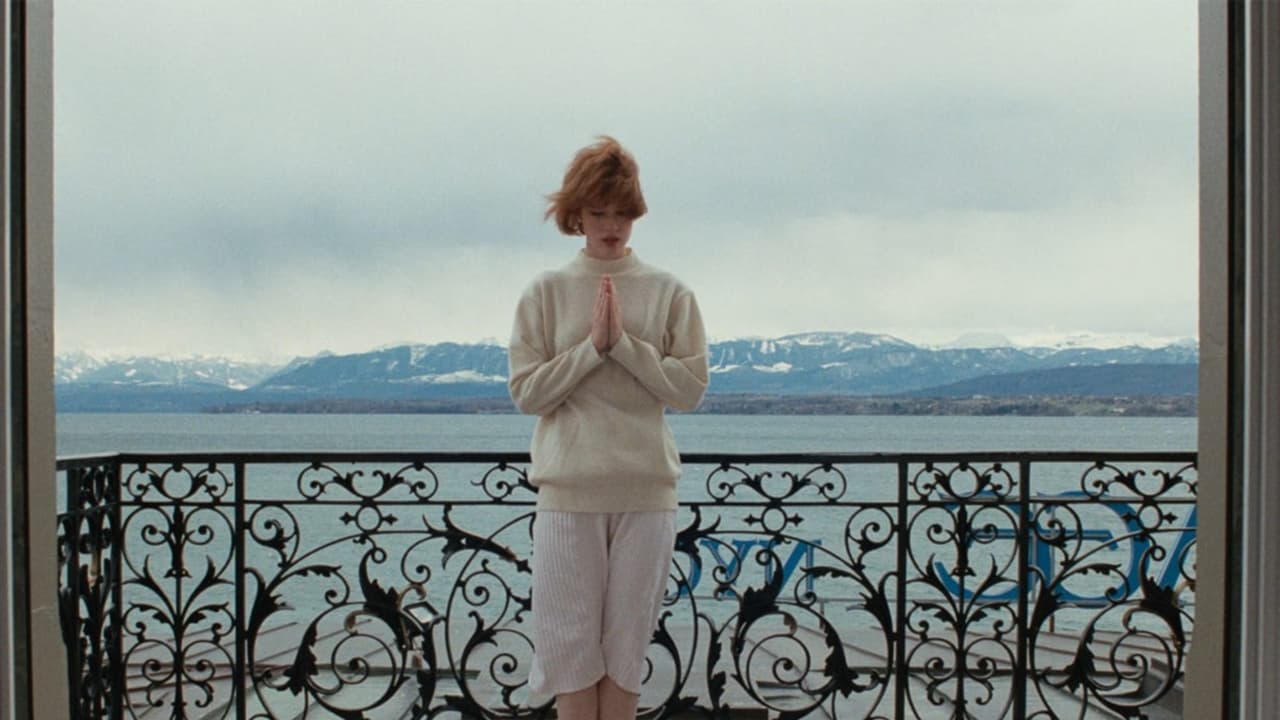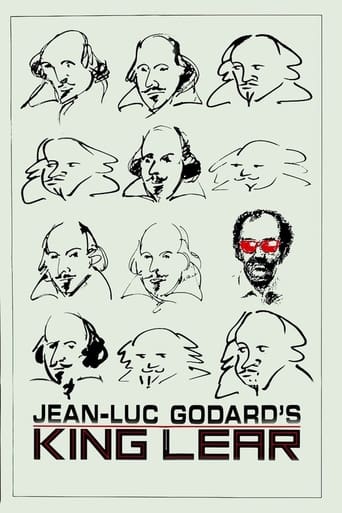

Wow! Such a good movie.
... View MoreTells a fascinating and unsettling true story, and does so well, without pretending to have all the answers.
... View MoreThe movie turns out to be a little better than the average. Starting from a romantic formula often seen in the cinema, it ends in the most predictable (and somewhat bland) way.
... View MoreThis film is so real. It treats its characters with so much care and sensitivity.
... View MoreThis film is absolutely brilliant. Weird characters and the fact that there's NO-THING really going on made this film interesting for me. Other people might find this film pointless and totally boring, but for me it's a treasure. I don't know anything about Shakespeare's 'King Lear' so I can't say if this film has anything to do with the actual play at all. This is exactly the kind of film that makes you think. After seeing this film you wonder what did the director want to tell me? Because clearly this film is made to communicate with the audience, it's an expression of the film maker's ideas, views and emotions. Or in other words... IT'S ART! The same goes to another Godard film 'Numero Deux'.
... View MoreI have watched this film perhaps 100 times, and many of those times I feel as if I am watching it for the first time. It is incredibly rich.Quite a bit of philosophical sophistication is presupposed, so let's start with some basics. When Plato says that what you hear does not come from what you see he is perfectly correct. The colors that are produced in your mind by a message from your optic nerve do not cause the sounds that you hear. The green is not in the grass, only in your mind. The grass absorbs various radio waves, and your eye picks up on the unabsorbed reflected waves. The green is your body's miraculous way of letting you know about the radio waves around you. You are actually experiencing a series of still pictures, approximately 24 per second. If they were significantly faster than that, you would experience a movie as a series of still pictures. You are active in this process, because you organize the raw sensations. This can be seen in a gestalt shift.In everyday experience we are isolated people. All we relate to are the images that are in our minds. Zen Buddhists think we can have direct contact with the mysterious outside reality--not merely contact with images that those objects helped produced (satori). Godard is concerned with satori, but he is also concerned with experiencing the projector of the series of still pictures that he is experiencing. Your mind is working incredibly hard organizing everything you are experiencing 24 times a second. The incredible amount of organization it takes for you to read this sentence is but a small fraction of what your mind has just done.If a child were very bored with a movie, he might look around and see that it all comes from this light in the back of the room. If you had no interest in the images thrown up on your private movie screen by the ground of your being, perhaps you too could turn around and experience this projector. I take the projector to be Atman. Brahman (which I take to be the same as nirvana) would be actually going into the projection room. This is what they are trying to do in the movie theater. But (Oh no!)they are not innocent, and we get caught up with these images (which together their relationship to other images Kant calls reality); they are like the child who is too interested in the movie to look around.Now it is like choosing the first fruit from a cornucopia. I had some understanding of the ending this time, so let's start there. Here comes the spoiler: a seagull calls. It is trying to make it's presence known for some reason or other. We experience merely the result of a message from the nerve from our ear. It significance is just that: it's merely in our minds, but it comes from an outside reality that is trying to makes its presence known. It is part of the world that is not mere representation. That world (sacred to Godard) is really out there. The movie ends with that reminder.The visual image at the end is merely the words: King Lear A Study. Godard is saying that he has figured out something about King Lear. What that might be is indicated by the preceding lines read by a female voice: "Lend me a looking glass, if that her breath will mist or stain the stone, why then she lives." A looking glass presents images that are recognized as images. Lear is hoping against hope that Cordelia is still alive. He would have been satisfied if she could have heaved her heart into her mouth, if the unseen reality could become manifest to him. But now there might be something that is not a mere image on the looking glass--the mist or stain. This mist would represent Cordelia's life. Of course it is just a representation or image of her life, but for Godard their are images and images. An image is strong (which means that it has greater emotive force) if the association of ideas is distant and true. The opposite of this would be a flat image, as if perspective had been abolished. When Godard goes back and forth between images that tend to merge into each other, we are relating to them as two dimensional. Cordelia could not heave her heart into her mouth, but if Lear had been perceptive her silence could have shown him about her inner reality. The mist on the stone would show her that she lives, and would thus have strong emotive force. He could relate to her inner reality through the representation.It is not Lear's voice that reads the lines at the very end of the film, but the same resonant female voice that is associated with the symbolism of the white horse. The horse would be the emotion that finds its occasion in the strong image. There is something within us that wants to break out of our isolation and rises to the occasion when an opportunity to do so presents itself. This wholehearted response to an image allows me to be without reservation, and thus for my solitude to know yours (satori).Right before that we have Lear saying "She is as dead as earth." This corresponds to the image of Lear with Cordelia's dead body looking out at the source of the waves. The pebbled shore would be the private movies screen with its many objects. The waves would be the 24 times a second movement that throws itself onto the movie screen. Lear is not letting death defeat him. He's using the emotive power of her death to try to succeed to turn toward the projector. Wait Cordelia. The earthly reality is not the only reality, and he would relate to that reality that now has Cordelia.
... View MoreThis is a strange film, but a likable one. It asks the question: what would we do if all the great works of literature were suddenly lost? In a way, this is Jean-Luc Godard"s "Wasteland": in a manner not unlike the T.S. Eliot poem, Godard fills his work with quotes, allusions, and sometimes outright plagiarisms of his favorite works of art, literature, and film, including hommages to Robert Bresson's "Trial of Joan of Arc" and Grigori Kozintsev's "King Lear"; there's even a character named Kozintsev in the movie. Godard is not making a movie based on Shakespeare's "King Lear": he's making a movie about "King Lear." Godard has always considered himself an essayist rather than a storyteller, and the frequent use of captions, stills, and other distancing devices are reminiscent of his hero Bertold Brecht. Marxist rhetoric, though not absent, is less strident here than in some of Godard's earlier works. The movie is fun if occasionally irritating and often incomprehensible. Of the international cast, Molly Ringwald gives a touching performance as Cordelia, conveying much of her character's anguish through body language alone; Burgess Meredith reads Lear's lines with authority, and one wonders how he would have measured up in a more traditional interpretation of the play. The film hints at father-daughter incest, but there's no overt sexuality.
... View MoreI don't know where to begin.I cannot contain my contempt for this film (if I dare call it a film). In my opinion this is the worst Shakespeare adaptation committed to any art form anywhere in history. And one of the most egotistical pieces of rubbish in the annals of film.It has NO USE. You couldn't even use this if you were doing a thesis of King Lear at college because this is faeces. Not to mention that it has hardly anything to do with the play King Lear. It has no plot, no interesting characters or character study and hardly anything in the way of decent direction.And it is not just the fact that it lacks so much, it is the fact that what it does have is so goddamn terrible. Quotes and sayings repeated endlessly, terrible seagull sound effects that 1) happen in scenes where there are no seagulls and even scenes when we are indoors 2) happen in scenes when there is other dialogue going on and 3) are so loud that your ears begin to bleed (well, nearly).I went to see this film because 1) I had only seen one other Godard movie Bande à Part (1964) and 2) I am a great Woody Allen fan. Now I mentioned earlier that this was egotistical and I will go further and say that this is sheer celluloid masturbation! Godard (in my opinion the most over rated director in cinema history) has almost become drunk with power, power gained from years of critics kissing his ass, and now believes he can do no wrong as long as he entertain and excites himself (i.e. masturbation). Another celluloid masturbator (for want of a better word) is Woody Allen, this shared hobby probably bringing the two together. But the one difference between these two is this, Woody Allen still has the gift to entertain and excited others as well as himself, whereas Godard lost this gift along long time before King Lear.Now I have wasted enough time talking about this catastrophe.I give it 0 out of 10.P.S. If you want a really good Shakespeare adaptation try Throne of Blood (1957).
... View More